Topic what are ecosystem services: Discover the unseen heroes of our planet: Ecosystem Services. These natural processes and benefits are essential for survival, enriching our lives beyond measure and fostering a sustainable future for all.
Table of Content
- What are ecosystem services and why are they important?
- Understanding Ecosystem Services
- Types of Ecosystem Services
- Provisioning Services: Nature"s Products
- Regulating Services: Nature"s Balancing Acts
- Cultural Services: Nature"s Imprint on Human Experience
- Supporting Services: The Foundations of Ecosystem Health
- YOUTUBE: Understanding ecosystem services
- The Importance of Ecosystem Services to Society
- Threats to Ecosystem Services
- Conservation and Sustainable Management of Ecosystem Services
- Ecosystem Services in Policy and Planning
- Case Studies: Success Stories in Ecosystem Services
- Future Directions in Ecosystem Services Research and Application
What are ecosystem services and why are they important?
Ecosystem services refer to the benefits that humans receive from nature or the natural environment. These benefits can be classified into four main categories:
- Provisioning Services: These services include the production of resources such as food, water, timber, and other raw materials that are directly used or consumed by humans. For example, forests provide timber, while agricultural systems produce crops.
- Regulating Services: Regulating services are processes that help regulate the environment and provide various benefits. These services include water purification, climate regulation, flood control, and pollination. Wetlands, for instance, can naturally filter pollutants from water.
- Supporting Services: Supporting services are the basic functions or processes that are necessary for the production of all other ecosystem services. These services include nutrient cycling, soil formation, and primary production. For example, plants convert solar energy into organic matter through photosynthesis, which ultimately supports other organisms and ecosystems.
- Cultural Services: Cultural services are the non-material benefits that humans derive from ecosystems. These services include recreational activities, aesthetic appreciation of nature, and spiritual or cultural values. National parks, for instance, offer opportunities for hiking, wildlife viewing, and other forms of recreation.
Ecosystem services are important for several reasons:
- Human Well-being: Ecosystem services directly contribute to human well-being by providing essential resources, supporting livelihoods, and ensuring food security.
- Biodiversity Conservation: Ecosystem services are closely linked to biodiversity conservation. Conserving healthy ecosystems helps protect the diverse array of species that contribute to these services.
- Environmental Sustainability: Recognizing and valuing ecosystem services helps promote sustainable land and resource management practices. This can lead to better conservation and protection of natural resources.
- Economic Value: Ecosystem services have significant economic value. For example, the economic contribution of pollination to global agricultural production is estimated to be billions of dollars per year.
- Climate Change Mitigation: Ecosystems play a crucial role in climate change mitigation by sequestering carbon dioxide and regulating the Earth\'s climate patterns.
Overall, understanding and appreciating ecosystem services is essential for sustainable development and the well-being of both humans and the environment.
READ MORE:
Understanding Ecosystem Services
Ecosystem services are the many and varied benefits that humans freely gain from the natural environment and from properly-functioning ecosystems. These include products like clean drinking water and processes that reduce natural hazards, regulate the climate, and pollinate crops. Understanding ecosystem services means recognizing how ecosystems support life on Earth, contributing to human well-being and economic prosperity.
- Provisioning Services: These are the products obtained from ecosystems, including food, water, timber, fiber, and genetic resources.
- Regulating Services: These services include the regulation of climate, floods, disease, wastes, and water quality.
- Cultural Services: These encompass non-material benefits obtained from ecosystems through spiritual enrichment, cognitive development, recreation, and aesthetic experiences.
- Supporting Services: These are the services that are necessary for the production of all other ecosystem services, such as biomass production, production of oxygen, and soil formation and retention.
Each of these services plays a crucial role in maintaining the balance and health of the Earth"s ecosystems. By understanding and valuing these services, we can better appreciate the indispensable contributions of ecosystems to our lives and work towards their protection and sustainable management.
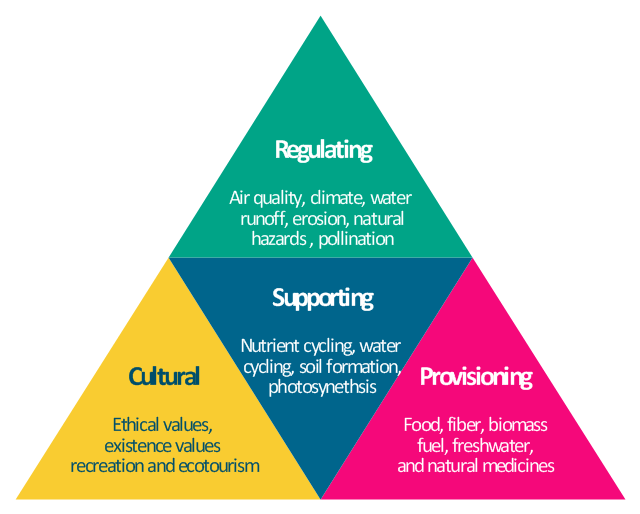
Types of Ecosystem Services
Ecosystem services, the benefits humans receive from nature, are vital for survival and well-being. These services are broadly classified into four main types, each playing a unique role in supporting life on Earth and human societies.
- Provisioning Services: These are the products provided directly by ecosystems, including food, fresh water, timber, fiber, genetic resources, and medicines. They are the basis for most of the world"s economic activities related to agriculture, fishing, and forestry.
- Regulating Services: Ecosystems regulate critical aspects of the natural world that benefit humanity, such as air quality, climate, water purification, pollination, disease control, and flood mitigation. These services help maintain the balance of the environment, making Earth a habitable place.
- Cultural Services: Cultural services offer non-material benefits that contribute to the development of cultures, spiritual well-being, recreational activities, and aesthetic enjoyment. These include landscapes" beauty, cultural heritage, social relations, and outdoor recreation.
- Supporting Services: These services are necessary for the production of all other ecosystem services, such as soil formation, photosynthesis, nutrient cycling, and water cycling. They underpin the functioning of the ecosystem, enabling the provision of provisioning, regulating, and cultural services.
Understanding these types of ecosystem services is crucial for developing strategies to protect and sustainably manage ecosystems, ensuring that future generations continue to benefit from these invaluable natural gifts.
Provisioning Services: Nature"s Products
Provisioning services are the tangible benefits we receive from ecosystems, encompassing the vast array of natural products that sustain and fulfill human life. These services not only provide the essentials for survival but also underpin economies around the globe, showcasing nature"s generosity.
- Food: From the fruits of the forest to the fish in our oceans, ecosystems supply a diverse range of food products. This includes grains, fruits, vegetables, meat, dairy, and seafood, supporting the nutrition and health of billions.
- Water: Ecosystems play a critical role in the natural hydrological processes, providing us with fresh water for drinking, irrigation, and sanitation through rivers, lakes, and aquifers.
- Raw Materials: Wood for construction and fuel, fibers for clothing, and other materials are all provided by various ecosystems. These materials are fundamental for shelter, clothing, and industry.
- Medicinal Resources: Many plants and animals serve as sources of medicinal compounds and traditional medicines, contributing to health care and pharmaceuticals.
- Genetic Resources: The genetic diversity found in wild plants and animals contributes to crop and livestock breeding, offering resilience and new characteristics that can lead to enhanced food security and medicinal discoveries.
Provisioning services are a clear testament to nature"s role as a provider, underscoring the importance of conserving and sustainably managing ecosystems to ensure these services continue to support future generations.
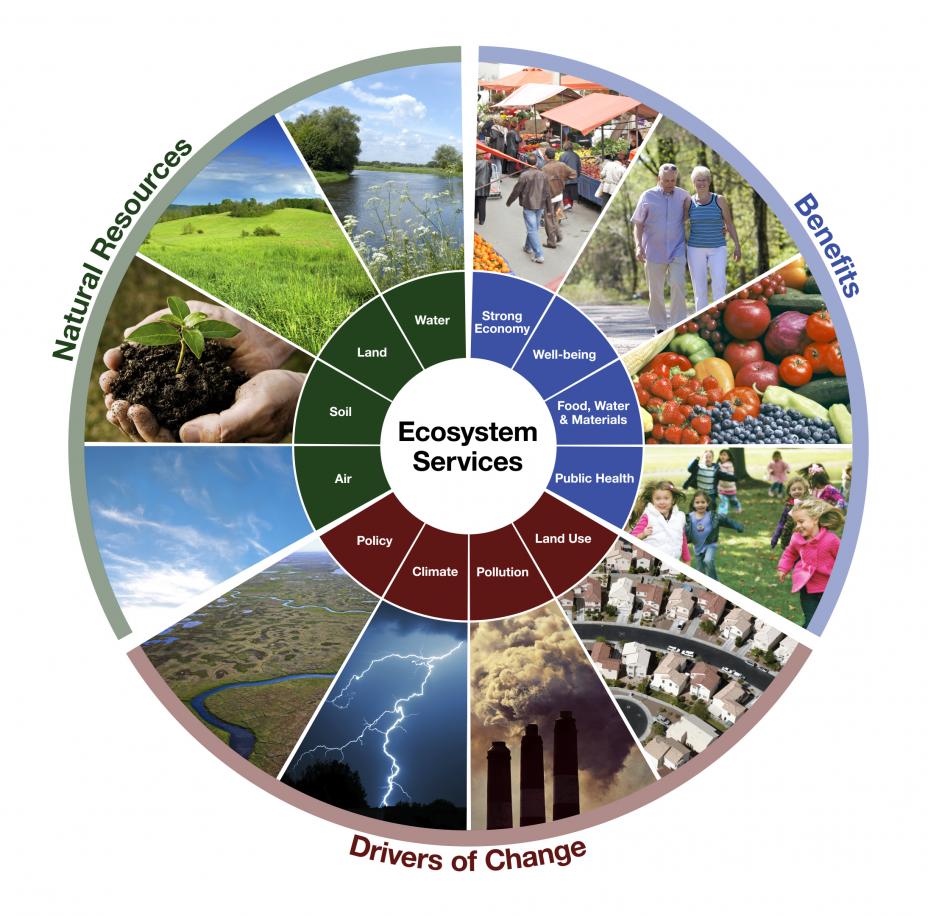
Regulating Services: Nature"s Balancing Acts
Regulating services are critical ecosystem functions that maintain the balance and quality of the Earth"s environment, indirectly supporting human survival and quality of life. These natural processes regulate the air, climate, water, and soil, mitigating environmental hazards and providing stability.
- Climate Regulation: Ecosystems like forests and oceans act as carbon sinks, absorbing and storing carbon dioxide, which helps to regulate global temperatures and mitigate climate change.
- Air Quality Maintenance: Vegetation captures pollutants and dust from the air, improving air quality and contributing to human health.
- Water Regulation and Purification: Wetlands, rivers, and forests regulate water flow, reducing the risk of floods and droughts, while natural processes filter and purify water, ensuring its quality for consumption, recreation, and habitat health.
- Pollination and Seed Dispersal: Wildlife, including bees, birds, and bats, provides essential pollination for many crops and wild plants, supporting food production and biodiversity.
- Disease and Pest Control: Ecosystems can control pests and disease vectors through natural predators and biodiversity, reducing the reliance on chemical pesticides and mitigating the spread of diseases.
By offering these regulating services, ecosystems play a fundamental role in maintaining the natural cycles and processes essential for life. Protecting and restoring ecosystems is crucial to preserving these vital services and ensuring a stable, healthy environment for future generations.
Cultural Services: Nature"s Imprint on Human Experience
Cultural services are the non-material benefits that people obtain from ecosystems through spiritual enrichment, cognitive development, reflection, recreation, and aesthetic experiences. These services deeply influence culture, spiritual beliefs, and personal identity, showcasing nature"s profound impact on human experience and societal development.
- Recreational and Touristic Enjoyment: Natural landscapes provide settings for leisure activities and tourism, offering opportunities for hiking, birdwatching, and nature photography, which enhance physical health and mental well-being.
- Spiritual and Religious Significance: Many cultures hold natural sites as sacred, which play a crucial role in spiritual practices and traditions, reflecting the deep spiritual connections people have with nature.
- Inspiration: Artists, musicians, and writers draw inspiration from the beauty and majesty of nature, creating works that reflect the aesthetic and intrinsic value of the natural world.
- Educational Value: Ecosystems serve as living classrooms, offering endless opportunities for learning and discovery about nature and conservation, fostering a sense of stewardship among all ages.
- Cultural Heritage and Identity: Natural landscapes are integral to the cultural identity and heritage of communities, preserving traditional knowledge and practices that have been passed down through generations.
Cultural services enrich our lives, offering countless opportunities for enjoyment, contemplation, and inspiration. Preserving ecosystems is not only an environmental imperative but also a means to safeguard our cultural heritage and ensure the continuity of these invaluable services for future generations.

Supporting Services: The Foundations of Ecosystem Health
Supporting services are the essential natural processes that underpin all other ecosystem services, making life on Earth possible. These foundational services maintain ecosystem health, biodiversity, and functionality, ensuring the continued provision of provisioning, regulating, and cultural services.
- Soil Formation and Composition: The creation and maintenance of soil are critical for plant growth, water filtration, and as a habitat for organisms, playing a key role in agriculture and natural vegetation.
- Photosynthesis: This fundamental process by which plants convert sunlight into energy not only provides the oxygen necessary for life but also forms the basis of the food chain, supporting ecosystems worldwide.
- Nutrient Cycling: The decomposition of organic matter and the cycling of nutrients like nitrogen and phosphorus are vital for ecosystem productivity, supporting plant growth and the health of terrestrial and aquatic environments.
- Water Cycling: Ecosystems regulate the distribution and quality of water through processes such as evaporation, condensation, precipitation, and infiltration, supporting all forms of life.
- Pollination and Seed Dispersal: These processes are essential for the reproduction of many plants, including those important for food, and contribute to genetic diversity and ecosystem resilience.
Supporting services are the bedrock upon which ecosystems function, offering crucial support to the web of life. Protecting these fundamental processes is essential for the sustainability of our planet"s natural systems and the continued benefit of all ecosystem services.
Understanding ecosystem services
Understanding: Dive into this captivating video that unravels the complexities of \"Understanding\". Discover fascinating insights and gain a deeper comprehension of the world around us. Watch now and expand your knowledge!
Exploring ecosystem services
Exploring: Embark on an exhilarating journey with this enthralling video that takes you on an expedition of \"Exploring\". From hidden treasures to uncharted territories, join us in the quest for adventure and watch this awe-inspiring exploration unfold. Don\'t miss out!
The Importance of Ecosystem Services to Society
Ecosystem services play a crucial role in sustaining and fulfilling human life, yet their importance is often overlooked. These natural services are vital for our survival, health, prosperity, and well-being, providing essential resources, maintaining the quality of our environment, and supporting economic activities.
- Support for Basic Needs: Ecosystem services provide the essentials for human life, including clean water, air, food, and raw materials, ensuring the fulfillment of our basic needs and supporting our health and well-being.
- Economic Benefits: Many sectors of the economy depend on ecosystem services, such as agriculture, forestry, fisheries, and tourism. Healthy ecosystems contribute to economic stability and growth, offering resources, jobs, and opportunities for sustainable development.
- Health and Well-being: Beyond physical health, ecosystem services contribute to mental and emotional well-being through recreational activities, nature experiences, and the aesthetic value of natural landscapes.
- Climate Regulation and Disaster Mitigation: Ecosystems play a key role in regulating the climate, sequestering carbon, and reducing the impact of natural disasters, such as floods and hurricanes, thereby protecting communities and infrastructure.
- Biodiversity Conservation: The maintenance of healthy ecosystems supports biodiversity, essential for ecosystem resilience, agricultural diversity, and the discovery of new medicines.
The conservation and sustainable management of ecosystem services are imperative for maintaining the health of the planet and ensuring a high quality of life for current and future generations. Recognizing the value of these services is the first step towards integrating them into policy and planning for a sustainable future.
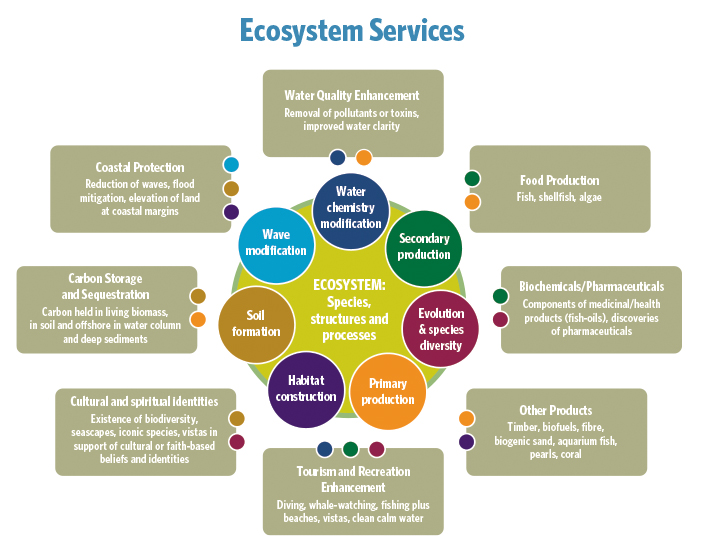
Threats to Ecosystem Services
The invaluable services provided by ecosystems are under increasing threat from human activities and environmental changes. Understanding these threats is crucial for devising strategies to protect and sustain ecosystem services for future generations.
- Habitat Destruction: Land use changes, deforestation, and urbanization lead to the loss of habitats, reducing biodiversity and the capacity of ecosystems to provide essential services.
- Pollution: Air, water, and soil pollution from industrial activities, agriculture, and urban runoff degrade ecosystems, affecting their ability to provide clean water, air, and other services.
- Climate Change: Rising temperatures, altered precipitation patterns, and increased frequency of extreme weather events disrupt ecosystems, affecting their health and the services they can provide.
- Overexploitation: Unsustainable harvesting of resources, such as overfishing and excessive logging, diminishes ecosystem capacity to regenerate and provide ongoing services.
- Invasive Species: Non-native species can outcompete native species, disrupting ecosystems and the balance of services they offer.
Addressing these threats requires coordinated global efforts to implement sustainable management practices, conservation initiatives, and policies that protect ecosystems and their services. By safeguarding ecosystems, we ensure the continued availability of the vital services upon which society depends.
Conservation and Sustainable Management of Ecosystem Services
The conservation and sustainable management of ecosystem services are critical to maintaining the health of our planet and ensuring that future generations can continue to benefit from the natural world. Implementing strategies that protect and enhance these services is a key priority for environmental sustainability.
- Protected Areas: Establishing and expanding protected areas to conserve biodiversity and ecosystem services, ensuring natural habitats are preserved and can continue to provide vital services.
- Sustainable Agriculture and Forestry Practices: Adopting practices that minimize environmental impact, enhance biodiversity, and maintain ecosystem functions, ensuring the long-term availability of provisioning services such as food and timber.
- Restoration Initiatives: Restoring degraded ecosystems to revive their capacity to provide essential services, including reforestation, wetland restoration, and the rehabilitation of coral reefs and other vital habitats.
- Integrated Water Resources Management: Managing water resources in a comprehensive and sustainable manner to balance human needs with the preservation of aquatic ecosystems and their services.
- Climate Change Mitigation and Adaptation: Implementing strategies to reduce greenhouse gas emissions and enhance ecosystem resilience to climate change impacts, protecting regulating services like climate regulation and flood control.
- Ecosystem-based Management Approaches: Managing ecosystems in a holistic way that recognizes the interconnectedness of different ecosystem services and aims for a sustainable balance between conservation and human use.
- Policy and Legislation: Developing and enforcing laws and policies that promote the conservation and sustainable use of ecosystems, including incentives for ecosystem service protection and penalties for activities that harm ecosystems.
Through these and other measures, it is possible to safeguard ecosystem services for the benefit of all. The collaborative efforts of governments, communities, businesses, and individuals are essential to the success of conservation and sustainable management initiatives.
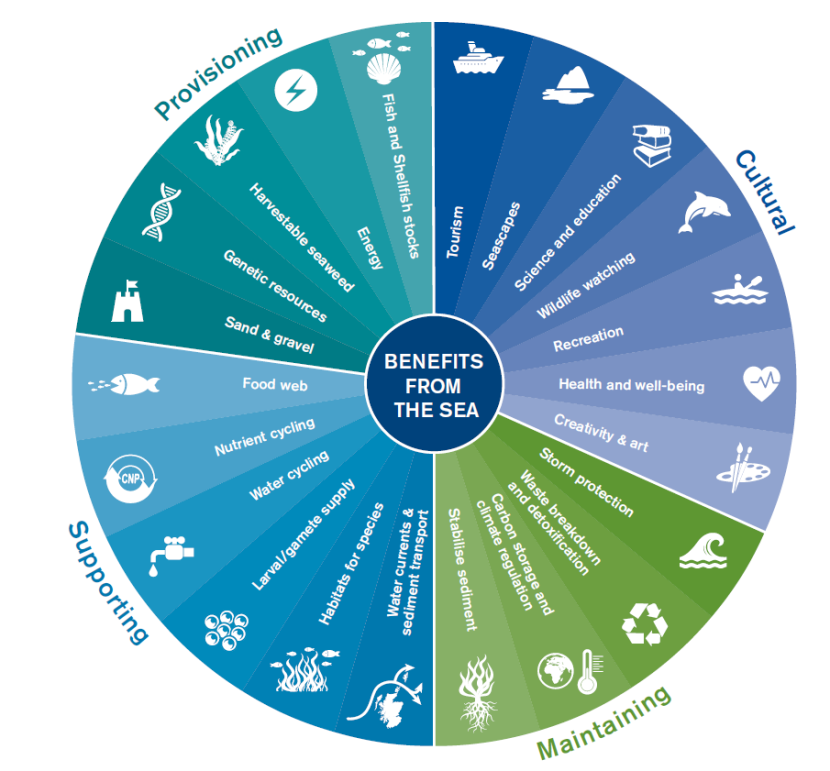
Ecosystem Services in Policy and Planning
Incorporating ecosystem services into policy and planning is essential for sustainable development, ensuring that the invaluable benefits ecosystems provide are maintained and enhanced. Integrating these services into decision-making processes supports environmental sustainability, economic prosperity, and societal well-being.
- Environmental Impact Assessments: Requiring assessments that consider the impact of proposed developments on ecosystem services can prevent degradation and loss, promoting more sustainable project outcomes.
- Green Infrastructure: Planning and implementing green infrastructure, such as parks, green roofs, and waterways, to provide regulating and cultural services, including climate regulation, recreation, and aesthetic values, while also enhancing urban resilience.
- Payments for Ecosystem Services (PES): Implementing schemes where beneficiaries of ecosystem services compensate those who manage ecosystems sustainably, providing financial incentives for conservation and sustainable management practices.
- Natural Capital Accounting: Integrating natural capital and ecosystem services into national and corporate accounting systems to reflect the true value of nature in economic decisions and policies.
- Biodiversity and Ecosystem Service Safeguards: Developing and enforcing safeguards in policies and projects to ensure that biodiversity and ecosystem services are protected and enhanced, rather than degraded.
- Climate Adaptation and Mitigation Strategies: Incorporating ecosystem services into climate change adaptation and mitigation strategies to enhance resilience and reduce vulnerability to climate impacts.
- Sustainable Land Use Planning: Adopting land use planning practices that conserve and restore ecosystems and their services, ensuring that development is balanced with the need to protect natural resources.
By recognizing the critical role of ecosystem services in policy and planning, governments and organizations can make informed decisions that promote the health of ecosystems and the continued provision of essential services, leading to more resilient and sustainable communities and economies.
Case Studies: Success Stories in Ecosystem Services
Highlighting success stories in the conservation and enhancement of ecosystem services demonstrates the powerful impact of sustainable management and conservation efforts. These case studies serve as inspirational examples of how understanding and investing in ecosystem services can lead to environmental, economic, and social benefits.
- Restoring the Mangroves of Vietnam: The restoration of mangrove forests in Vietnam has provided significant coastal protection, carbon sequestration, and livelihood improvements for local communities, showcasing the multifaceted benefits of ecosystem restoration.
- New York City"s Water Supply: Investing in watershed protection in the Catskill Mountains has allowed New York City to maintain its high-quality water supply without the need for expensive filtration plants, demonstrating the value of regulating services.
- Community-based Reforestation in Nepal: Nepal"s community forestry programs have successfully restored degraded lands, enhancing biodiversity, carbon storage, and local livelihoods through sustainable timber and non-timber forest products.
- Pollination Services in California"s Central Valley: Sustainable farming practices that support bee populations have enhanced pollination services, leading to improved yields in almond orchards, highlighting the economic and environmental benefits of supporting regulating services.
- The Great Green Wall in Africa: An initiative to combat desertification through the planting of a vast belt of trees across Africa aims to restore degraded landscapes, improve agricultural productivity, and sequester carbon, illustrating the potential of large-scale conservation projects.
These case studies exemplify the positive outcomes that can be achieved through the conservation and sustainable management of ecosystem services. They provide valuable lessons and models for replicating similar successes in different contexts around the world.
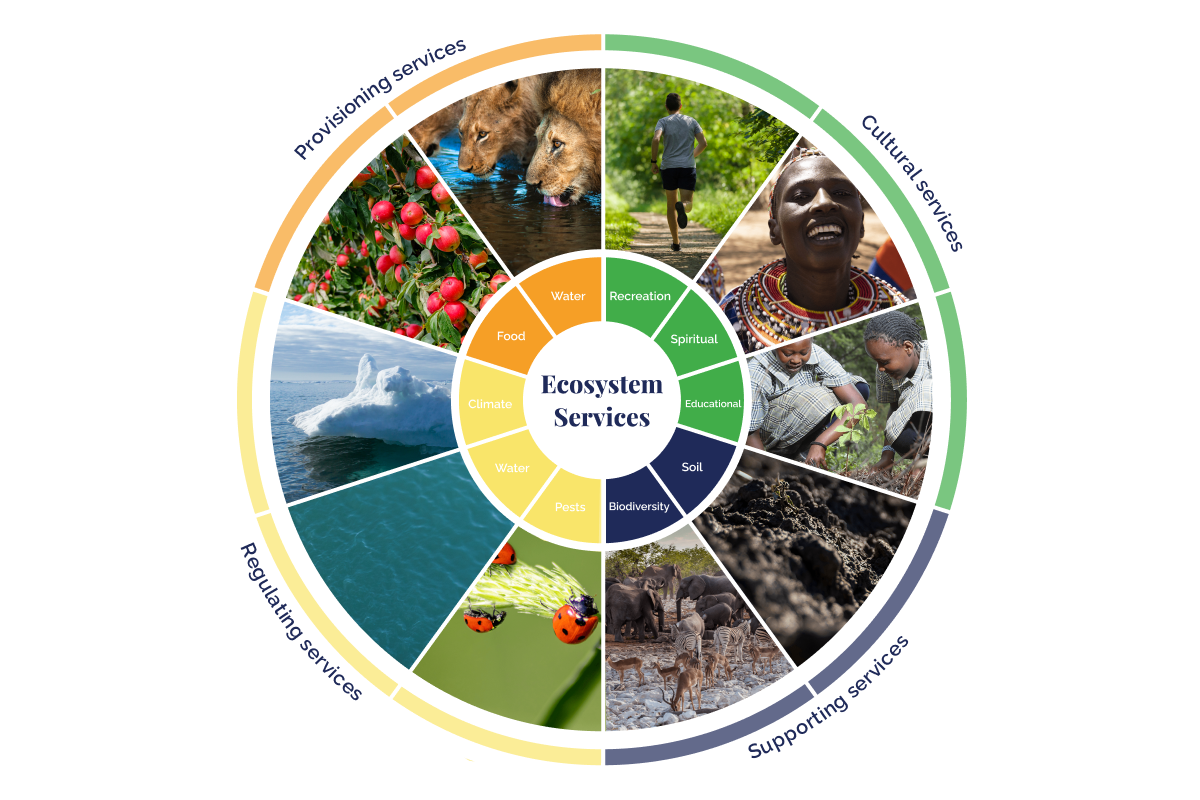
READ MORE:
Future Directions in Ecosystem Services Research and Application
The field of ecosystem services is rapidly evolving, with new research directions and applications continually emerging. These advancements aim to deepen our understanding, improve management strategies, and integrate ecosystem services more effectively into societal decision-making processes.
- Enhanced Valuation Techniques: Developing more sophisticated methods for valuing ecosystem services, including non-market benefits such as cultural and regulating services, to better inform policy and economic decisions.
- Integration into Mainstream Policy: Working towards the broader integration of ecosystem services into national and international policy frameworks, including climate change, biodiversity conservation, and sustainable development agendas.
- Technological Advances: Leveraging technology, such as remote sensing and GIS, for better mapping, monitoring, and management of ecosystem services, enabling more precise and efficient conservation efforts.
- Interdisciplinary Research: Promoting interdisciplinary collaboration that combines ecology, economics, sociology, and other disciplines to address complex challenges in ecosystem services research and application.
- Community Engagement and Co-Management: Encouraging greater community involvement in the management of ecosystem services to harness local knowledge and ensure the equitable distribution of benefits.
- Climate Change Adaptation and Mitigation: Focusing on the role of ecosystem services in climate change adaptation and mitigation strategies, including carbon sequestration and disaster risk reduction.
- Novel Conservation Financing: Exploring innovative financing mechanisms for ecosystem service conservation, such as green bonds and environmental impact investments, to secure sustainable funding sources.
As we move forward, these future directions promise to enhance the resilience of ecosystems and their capacity to continue providing essential services, highlighting the importance of ongoing research and application in shaping a sustainable future for all.
Embracing ecosystem services offers a path to harmonize human well-being with nature"s bounty, urging us to protect the invaluable resources that sustain life on Earth for present and future generations.

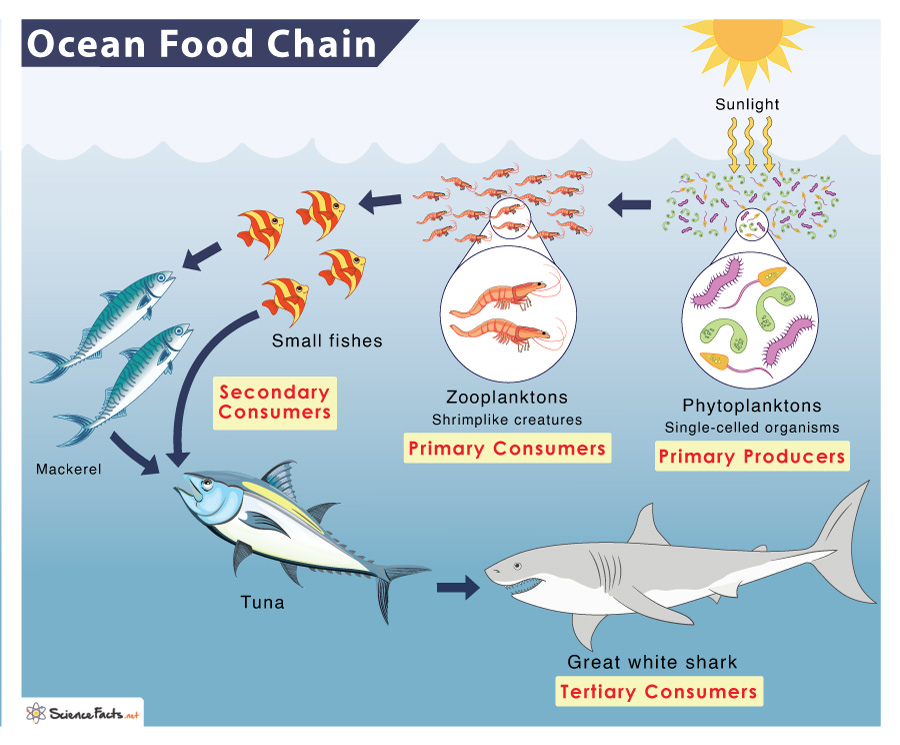

:max_bytes(150000):strip_icc()/489034241_5-56af62885f9b58b7d0183204.jpg)


:max_bytes(150000):strip_icc()/497408077-56af61ff3df78cf772c3c309.jpg)


